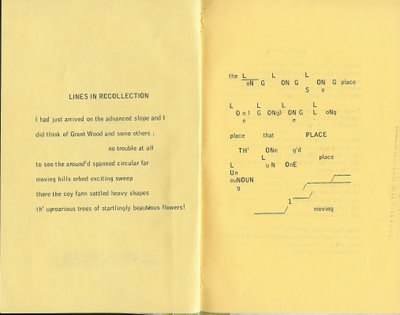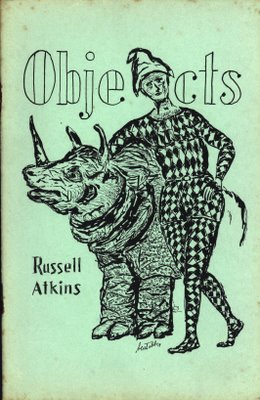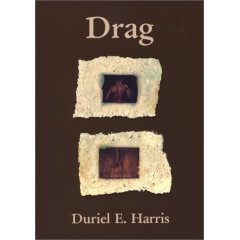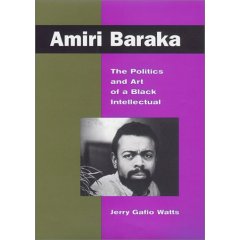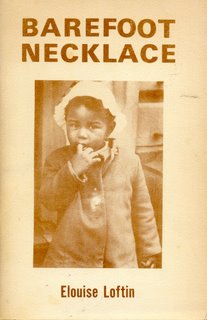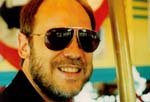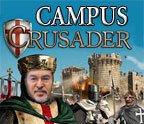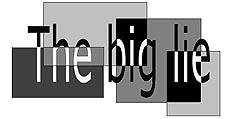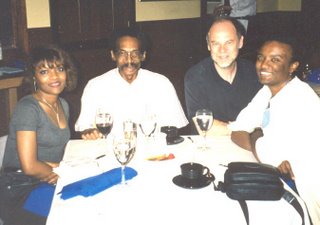
For a couple of years, Lorenzo Thomas and I conspired to be in Boulder, Colorado, at the same time when we could. This began when my wife, Anna Everett, was teaching in Film Studies at the University of Colorado. During our stay there, we of course took advantage of the programming at Naropa, which included Lorenzo nearly every year. From that first summer, we tried to arrange our visits for the Fourth of July so that we could cap the evening with fireworks over Boulder. This photograph shows one of our last visits. Here we're at dinner, joined by Harryette Mullen, who was also visiting Naropa that season. It really was a poetry family affair. These were great poets and great company.
I had been reading Lorenzo Thomas's poetry for many years before I first met him. His chapbooks and selected volumes were among the small number of small press titles that would show up in book stores in D.C. in those days, and his was the kind of work that made you seek out more. It wasn't until the latter part of the 1980s that I met him, though; we were introduced to one another by Charles Bernstein in a hotel lobby during one of the MLA's visits to D.C. - People often wonder at my love of academic conferences, but meetings like that one are among the reasons I try to stay active in these professional associations. Over the years, conferences were where Lorenzo and I visited with one another. We also increasingly found ourselves working together on conference projects. There were so many occasions when we spoke together, or when one of us was the respondent to the other, that we were becoming a sort of critical/poetic tag team at these events. Lorenzo was somebody you would always learn something from, and he was also among the most generous people I've ever known. Much of my work on poetry and music was helped along by Lorenzo's willingness to share his collection of recordings with me. Typically this would happen when, over drinks (as in the photo above) I would ask Lorenzo if, say, he'd ever come across an LP titled NEW JAZZ POETS. He would muse a moment, then invariably came the same answer: "I think that may be in the closet in New York. I'll ask my brother to dig it out for us." Lorenzo's brother, Cecilio, a person every bit as kind and generous as Lorenzo, was the artist whose work appears in so many of Lorenzo's publications. About a month later, I would get a cassette tape in the mail.
I was able to help a bit in Lorenzo's work as well. On several occasions I was a"blinded" peer reviewer for Lorenzo's critical works. A particular pleasure was being able to do that work with the manuscript of EXTRAORDINARY MEASURES, a book increasingly cited by other scholars.
When Lorenzo died this past July 4th, I had just read the manuscript for a book about music that he had submitted to the University of Michigan Press. I've been in discussions with the press since Lorenzo's passing, and I am happy to report that they are willing to go forward with the project. In the coming months, I'll be working to get the manuscript into final shape for publication. Barry Maxwell is also working on a collection of Lorenzo's essays and talks.
A few years back, Barry organized a panel on Lorenzo's work at the American Studies Association meeting in Houston, where we were joined by Kalamu ya Salaam and Maria Damon. We had a great dinner afterwards with Lorenzo and Karen, and Roberta Hill. Wish to god I'd had my camera along that time. Jim Smethurst has organized a panel in Lorenzo's memory that has just been approved for the next American Studies meeting at Oakland in the Fall.
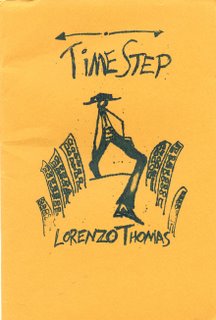
It is as a poet, though, that Lorenzo Thomas has the greatest claim on our attentions. The last serious time I spent with Lorenzo was at the conference held at Miami Univeristy in Ohio that has since been memorialized in the anthology RAINBOW DARKNESS, edited by Keith Tuma. Lorenzo read his poetry and delivered a keynote address, included in the anthology. You can find information about the book at:
http://www.orgs.muohio.edu/mupress.
Lorenzo's last pulished full colletion of poetry was DANCING ON MAIN STREET, which includes the chapbook shown here, TIME STEP, and was published by Coffee House Press. John Ashbery had this to say about Lorenzo's final book:
"Lorenzo Thomas's poems have a graceful New York School nonchalance that can swiftly become a hard and cutting edge when he writes of the African American experience, especially in his adopted home of Texas. 'This useless clairvoyance/is embarrassing,' he confides. Yet Thomas's brand of clairvoyance is not only useful, but beautiful."— The book is still available, and you can find information bout it at: http://www.coffeehousepress.org/dancingonmainstreet.aspIn the future, I hope to put up a Lorenzo Thomas web site. For now, here is some of his work.
DOWNTOWN BOOM
There are no gospel singers
Anymore
On the corners
They held down for Jesus
Valets park cars
At restaurants for fancy people
On expense accts or dates
So many times
People come up to me
And say, Billy
Hey wait a minute
You not Billy!
You can see the new ballpark
Just past the Courthouse
But which way is redemption?
-----------------------------------------------
AILERONS & ELEVATORS
Autumnal Equinox 2002
The backward see
The wise don't say a word
Three dreams, one foolish
And two meaningless
Are haunting me, disturbing me
One says
A golden road was plotted out for you
In dreams, of course
But that's not where you are
When you awaken
The danger is seeing the world
as two extremes
The afternoons of rushing home to see her
Balanced against
turning the corner
Hoping that her car will not be there
Daydreams are better
Nice –
watching the planes come in
On the last day of summer
Airport peaceful
Passengers are few
On flights answering demand
more than desire
Their stress has been at home
Or will come later
They deplane calmly
When the Wright boys
and their friend Paul Laurence Dunbar
Finished high school in 1890
Their neighbors knew
That they'd go high up in this world
Paul as an elevator boy in downtown Dayton
Orville and Wilbur
Going swimming in thin air
Unfortunately,
They'd never heard of Richard Gallup
David or Romare Bearden, either
Such are the baffling deficits that time imposes
They never dreamed
Someone would use an airplane
To drop bombs made of oilfield dynamite
and set Greenwood aflame
Andrew Smitherman fleeing in 1921
from Tulsa to New York
To the edge of America
What is this shadow
Cast across the coming season?
In the still watches of the Negro night,
Fear rising like mist off a bayou,
The danger in the world
Is seeing it as two extremes
Is this full moon so indiscriminate
That even liars prosper
if they have launched
Their web with the new moon?
This autumn equinox
A harvest of deceit
Leaves the ground rugged.
The harvest done, the fields outside the city
flat and sere
A single egret stands in the parking lot at the Post Office
Poised and confused
The world automatically recoils
Into itself
Are you ready for football?
For serious business
Are you ready for war?
People throughout all history
Have lived in ashen cities
or died in them
Marcel Duchamp was joking
Wasn't he, as always when he said
Dust-covered glass
Might offer auguries
Of our predicament
O mirror, mirror
How have my people been distracted so
They don't care any longer who they are?
How so misled that they believe
Punishment does not apply
To crimes committed in their name?
Must war morph from Nintendo game to spectacle
To get attention?
If all are suspect
Could my own duplicities
Be causing this –
The way we're all responsible
For air pollution
(if you keep breathing
If you believe in magic, yes
And that same magic, yes
Could stop the rush to madness, too
There are still
scraps of summer laughter
On the street
There's still some music from two backyards away
The Funkadelics and Jay-Z resist denial
But here's
The truth:
You have the right to keep your mouth shut
Trust me,
Across the room
A person looking like a crazy version
Of somebody you once knew
Might be our Savior
One who can draw fire
Out of ashes
At least a lover, maybe
The one to take you up a little higher
Or let you down easy.
But don't look this way,
It isn't me
New York City
22 September 2002



